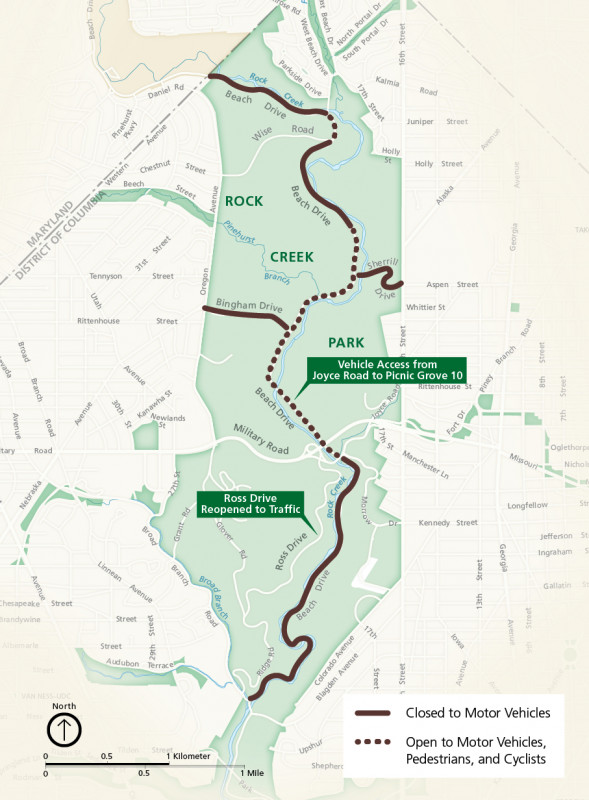The L Word: this week, the National Park Service showed leadership

跑步者在岩湾公园海洋有限公司rps Marathon.Imageby Joe Flood licensed underCreative Commons.
周三,国家公园Service (NPS) announced it would keep most of Beach Drive in Rock Creek Park in upper NW DCclosed to private vehiclesthroughout the year. According to a map released by NPS, Beach Drive will be closed from the Maryland line near Chevy Chase to West Beach Drive, from Wise Road to north of Sherrill Drive, and from Joyce Road to Blagden Avenue.
The decision’s important not only for the many people who enjoy Rock Creek Park on foot, bike, rollerblades, or just hanging around, who can now do so free of fast, unpredictable, multi-ton vehicles in their midst. It cuts against institutional norms and history of prioritizing cars, tracing back to theMcMillan planin 1902 and baked into our local planning by the National Capital Planning Commission.
After NPS released an interim recommendation in July 2022 that would haverestored car accessfor most of the year despite most feedback asking for a full-time closure, the news surprised many observers. Following up on one of its chief concerns at the time, NPS now says that it has consulted with the District Department of Transportation (DDOT) and found the impacts on nearby streets would be negligible.
Rock Creek Park is a major localecosystemthat gains nothing beneficial from vehicular traffic, but does suffer its ill effects (like air pollution, which afflicts96% of national parks). More broadly, it’s a tough pill to swallow, but themedicine of disincentivesworks. Every car journey that becomes slightly less attractive within a city can be a win for the environment, because it becomes more urgent to improve the alternatives across the system. Transit, walking, and biking only become the default choices for trips when driving is no longer the easy option it once was.

Map of road closures in the upper section of Beach Drive in Rock Creek Park.Image from NPS.
A November surprise
But none of these important factors concerning specifically Rock Creek Park and its environs explain why I got tears in my eyes reading about NPS’s decision on Wednesday.
It takes, and will take a lot more, leadership to wean Americans in particular off of ourcar dependency, apublic health crisiswith severe implications for safety, respiratory health, and access to physical activity. The national park system has acar disease,symptoms of which include air pollution, crashes, accessibility issues, and perverse prioritization of cars and parking lots over the people and wildlife it’s supposed to serve. Its decision to ban cars from Beach Drive seems obviously right to the many advocates and community members who spoke up (thank you, Washington Area Bicyclists Association, People’s Alliance for Rock Creek, and others). But for the people leading this public organization to acknowledge that cars, people, and wildlife preservation areincongruentpriorities shows the kind of leadership that we need to see happening every day.
If we’re to be free of a system that harms the environment, prioritizeswealthier,whiterdrivers, and puts human life in unnecessary danger, it’s the old ways of putting cars first that have to go, which means trade-offs. Leaders who are well-known, and leaders in semi-bureaucratic roles we’ve never heard of, will have to consistently make those decisions.
Three cheers for the National Park Service this week for putting things in perspective and showing leadership.
